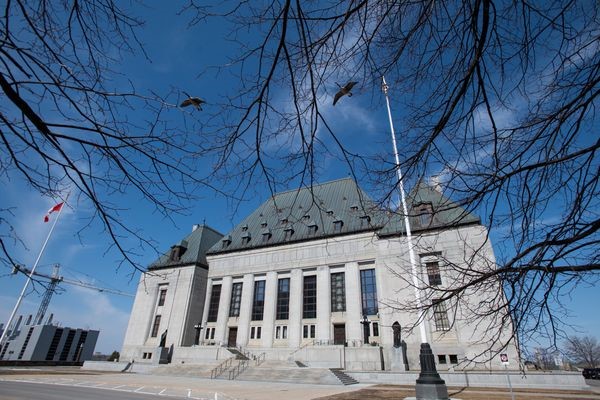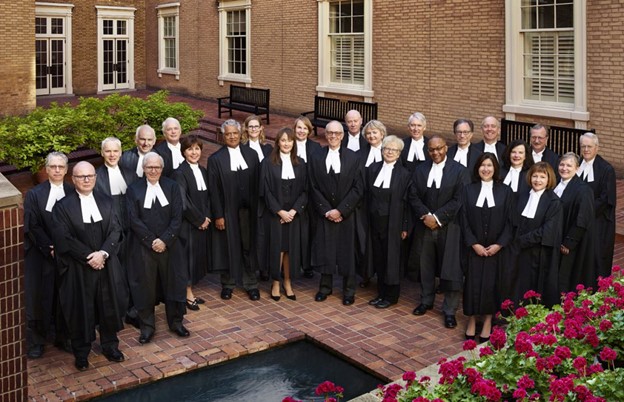Cory Wilson is a criminal defence lawyer serving Calgary, Okotoks, Airdrie, Strathmore, Cochrane, Canmore, Didsbury, Medicine Hat, Lethbridge, Grand Prairie and Turner Valley.

The Supreme Court of Canada has ruled against accused people in 34 sexual-assault cases in a row, stretching back more than four years, making it more difficult to overturn such convictions on appeal as the cases pour in during the Me Too era.
The Globe and Mail reviewed all sexual-assault cases heard by the Supreme Court since 2014. Thirty-six cases have reached the court since the beginning of 2018, and 19 in the previous four-year period – a near-doubling that reflects a fast-changing area of law in which lower-court judges are struggling to keep up. The last case won by the defence was in February, 2018. (The numbers do not include a handful of cases decided on extraneous legal issues, such as delay; all such issues have been decided in the Crown’s favour since 2018.)
The losing streak for accused people has some criminal-defence lawyers questioning whether the Supreme Court is committed to balance, fairness and the presumption of innocence in sexual-assault cases. Some feminist observers, on the other hand, view the rulings as a course correction for a system still permeated by myths and stereotypes.
Many of the cases turned on the credibility of complainants. The Supreme Court has ruled repeatedly that, if the judge who presided over a trial believes a complainant, appeal courts should not disturb a conviction. While that is not new law, the court has reinforced the message by rebuking some of Canada’s most experienced appellate judges, whom they view as having ignored that principle.
In every instance over the past four years that the top courts of the provinces threw out a sexual-assault conviction over perceived unfairness to the accused, the Supreme Court said those courts got it wrong. There were 14 such cases out of the 34 consecutive defence losses.
Even when a trial judge’s explanation of their ruling is ambiguous, which in the past left the door open for a successful appeal, the court has established a presumption that the judge understood the law and applied it correctly. The court has also cast doubt on the existence of “uneven scrutiny” – a notion often advanced by defence lawyers that judges were tougher on one side’s inconsistencies than on the other’s.
Defence lawyers say it is now highly difficult to overturn a conviction on appeal, even when fairness to the accused is in question.
The stakes are high for accused people, said Mona Duckett, a former president of the Alberta Criminal Trial Lawyers’ Association, and a co-author of a textbook, Trial of Sexual Offences.
“The system cannot move away from the presumption of innocence to an unstated presumption that the sexual-offence complainant should always be believed, therefore the accused person must be lying,” she said. “At times, it feels like we’re moving in that direction.”
Toronto lawyer Matthew Gourlay, a co-author of Modern Criminal Evidence, a textbook for litigators and judges, said the Supreme Court has repeatedly affirmed the importance of vigilance to protect against wrongful convictions. “Yet several justices seem to have a blind spot where sexual offences are at issue.”
Women’s groups strongly disagree that the Supreme Court has a blind spot or is moving toward a presumption of belief in complainants’ testimony.
“Myths and stereotypes and the unique distrust and discounting of sexual-assault complainants have been in our justice system for hundreds of years,” said Joanna Birenbaum, a Toronto lawyer who has appeared before the Supreme Court to defend the equality rights of sexual-assault complainants on behalf of the Barbra Schlifer Commemorative Clinic. The trend at the Supreme Court “is not in any way about a dilution of the reasonable doubt standard or about reduced scrutiny of convictions in sexual-assault cases, it is course correction.”
Both groups, however, agree that the sheer number of sexual-assault cases making their way to the Supreme Court highlights uncertainty in the lower courts in an area of law that is changing quickly because of new legislation and evolution in public attitudes.

Constance Backhouse, a legal historian and a former chair of sexual-assault law at the University of Ottawa.Tijana Martin/The Globe and Mail
Daniel Brown, a co-author of Prosecuting and Defending Sexual Offence Cases, said the textbook’s 2017 edition was completely rewritten for 2020, to reflect rapid changes in the law. Both defence lawyers and women’s groups see a need for more training of judges on sexual-assault law. “There is evidence from across the country that judges seem to be struggling with these issues. I see it every day,” Mr. Brown said.
The 36 cases since 2018, of which the defence won just one, amounted to one-third of all criminal cases decided by the Supreme Court over that period, and about one in six of all decided cases. (The defence won three of the 19 in the previous four years.)
Constance Backhouse, a legal historian and former chair of sexual-assault law at the University of Ottawa, said the numbers may be connected to the Me Too movement, which first caught fire on social media late in 2017.
“There are, I think, huge built-in pressures not to speak about sexual assault. That’s the biggest problem that the legal system has seemed incapable of addressing. The Me Too movement began a big change where large numbers of women, many of them named celebrities, came out in the open and said ‘I’ve experienced this,’ and lots and lots of women followed,” she said.
The large flow of cases relates directly to disputes in the lower courts. Usually, the Supreme Court chooses the cases it hears from a large supply of requests, based on its view of what legal issues need to be settled in the national interest. But most of the sexual-assault cases reached the court as “automatic” appeals (for which the court’s permission is not needed), when appeal court judges disagreed on a conviction, or an acquittal was thrown out by an appeal court.
Because the court often ruled directly “from the bench” in these cases, after a brief huddle of 30 minutes or so, and typically in statements of just two or three paragraphs, the rulings have not usually attracted wide public attention.
Most involved the basics of sexual-assault trials – issues of consent, credibility, and intoxication – rather than novel legal concerns. Unlike in cases where DNA or an alibi can help clear an accused, Mr. Brown said, “it’s very difficult to establish a person’s innocence. There is no objective marker of innocence in those cases.”
A defence lawyer may focus at trial on inconsistencies in a complainant’s testimony, to question their credibility. And if the defence loses at trial, they may try to persuade an appeal court that a trial judge did not sufficiently explain why they believed the complainant, or that the judge gave more scrutiny to the testimony of the accused than that of the complainant.
In 13 of the 14 cases in which appeal courts had thrown out convictions, the Supreme Court restored the convictions; in the lone exception, it sent the case back to an appeal court to consider other, still unresolved, issues. The court overturned rulings from veteran judges such as Ontario Chief Justice George Strathy; from Justice David Paciocco, whose books, articles and rulings the Supreme Court has often cited in other cases; and from Justice Marc Monnin of Manitoba, who as a former chief justice of the Court of Queen’s Bench is an experienced trial judge.
“Are all the provincial courts of appeal getting it badly wrong?” Mr. Gourlay asked. “Do they have a systematic pro-defence bias? Not likely, and not consistent with my experience. The better explanation is that the Supreme Court has become far too willing to overlook significant flaws in trial proceedings in order to uphold convictions where experienced judges of the courts of appeal have identified serious cause for concern.”
A key precedent that concerned Mr. Gourlay and other defence lawyers came last May, in a case called G.F. (the initials are to protect the complainant’s identity) in which a man and woman were charged with sexually assaulting a 16-year-old, intoxicated girl on a camping trip. She testified that she woke to sexual acts being performed on her, and ultimately acquiesced because she felt she had no choice; the male accused described her as an enthusiastic participant.
The judge who oversaw the trial found the complainant credible and convicted the couple. But three Ontario appeal court judges with 78 years of combined experience on the bench ruled unanimously that the judge had not properly explained his ruling, especially around the complainant’s capacity to consent when intoxicated.

This was one of a handful of sexual-assault cases the Supreme Court chose to hear (as opposed to those that reached the court as automatic appeals), and the court’s ruling included a strong rebuke of appellate judges.
Writing for herself and five others, Justice Andromache Karakatsanis said appeal judges had thrown out sexual-assault convictions over credibility, “not on the basis of legal error but on the basis of parsing imperfect or summary expression on the part of the trial judge.” Two other judges, Justice Russell Brown and Justice Malcolm Rowe, said the trial judge’s explanation was weak, but that there was enough evidence to convict anyway. Justice Suzanne Côté said she would have acquitted the couple.
The Supreme Court of Canada has sided with the prosecution in 34 sexual-assault cases in a row, a streak that began four years ago.
In the 14 cases, Justice Côté, Justice Brown and Justice Rowe were the only ones to dissent multiple times on the side of the accused. Justice Nicholas Kasirer was the only other judge on the nine-member court to dissent even once on that side.
The result of G.F. and other cases is that it is becoming increasingly difficult to overturn a judge’s credibility assessments on appeal, criminal-defence lawyers said. “Occasionally, a court of appeal will rule in favour of the defence on one of these issues because of a trial judge’s mistake, but that feels rare,” Ms. Duckett said. “These credibility cases must be won at the trial level.”
Lawyers have had to change their advice to clients, Mr. Brown said. “The advice is still ‘if you’re innocent and wrongly convicted, you should appeal your case.’ But also, ‘the courts are going to have very little time for the types of arguments we can raise that demonstrate you were wrongfully convicted.”
Appeal courts around the country have cited G.F. in more than 40 sexual-assault rulings since last May, a large majority of which went against the accused, The Globe found in a review of a legal database.
Some feminist observers say the Supreme Court could have sent a stronger message in certain cases if it wrote full reasons. In Snelgrove, a 2019 case from Newfoundland and Labrador, the court provided just a brief explanation for its decision to uphold an order for a new trial for a police officer who abused his authority to obtain the legally questionable consent of an intoxicated complainant.
“The SCC has never really considered the section [of the Criminal Code] that says consent is not present when the accused induces consent by abusing a position of trust or authority,” said Janine Benedet, a specialist in sexual-assault law at University of British Columbia’s Allard School of Law. “That was a missed opportunity.”
The most recent case in which the court ruled for the defence was called G.T.D. It involved an Edmonton man’s alleged rape of a former intimate partner in front of their two children. Police had cautioned the man about his right to counsel and silence, closing with a question: “Do you wish to say anything?” His response helped convict him, and that conviction was upheld 2-1 by the Alberta Court of Appeal.
But the Supreme Court ruled 4-1 on Feb. 14, 2018, that the police had violated his constitutional right to counsel by asking him that question, and ordered a new trial. (Only Chief Justice Richard Wagner said he would have upheld the conviction.) That April, in Alberta Provincial Court, the charge was stayed, and G.T.D. was not prosecuted again for the alleged offence.
Cory Wilson is a criminal defence lawyer based in Calgary. If you have been charged with a criminal offence or are a suspect in a criminal investigation, call today for a free, no obligation consultation.
